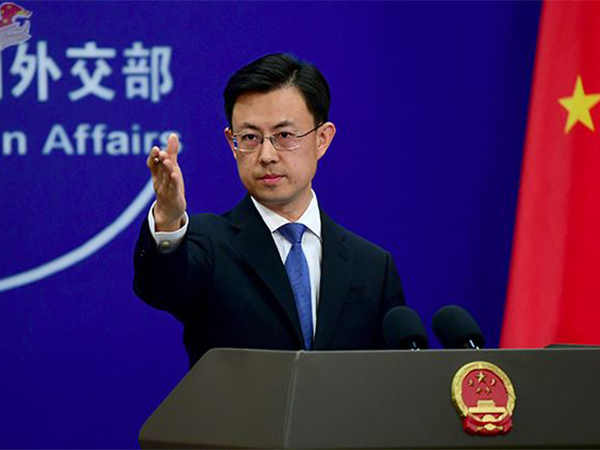Biden seeks to recalibrate US relations with Middle East countries
Jul 11, 2022

By John Solomou
Nicosia [Cyprus] July 11 : US President Joe Biden's first official visit to the Middle East this week clearly shows that, in the wake of the Russian invasion of Ukraine and the big energy crisis created for European countries, he has realized that he must reverse the US strategy of withdrawal from the Middle East and try to recalibrate his relations with Middle East leaders.
From July 13-16, Biden will visit Israel, the occupied West Bank and Saudi Arabia and will have talks with Israeli caretaker Prime Minister Yair Lapid, Palestinian President Mahmud Abbas and Saudi Crown Prince Mohammed Bin Salman.
President Bident will try to convince his interlocutors that the United States, although it gives emphasis to its rivalry with China, does not intend to disengage from the Middle East and will not abandon its allies. After all, the US has succeeded in reviving NATO and may do the same in its relations with its Mideast allies.
In an op-ed piece in the Washington Post published on Saturday, President Biden reminded readers that his administration helped end the 2021 War in Gaza between Israel and Hamas, which could have lasted months, in just 11 days. "We have worked with Israel, Egypt, Qatar and Jordan to maintain peace without permitting terrorists to rearm," he wrote.
Biden also underlined the fact that he has rebuilt relations with Palestinians, restoring USD 500 million of aid to the Palestinian Authority, which had been blocked for years, while also passing a USD 4 billion support for Israel, the largest US aid ever given to the Jewish state.
In Israel, the US President will have talks with caretaker Prime Minister Yair Lapid with the stated US aim of "deepening Israel's integration in the region, that will be good for peace and good for Israel's security. This will not present any problems, as the two leaders are like-minded and are facing similar challenges from populist predecessors: Biden from Donald Trump and Lapid from Netanyahu.
The two issues where Biden and Lapid have different views are the issue of the Iran nuclear deal - as Iran is now close to producing enriched uranium to near military-grade- the expansion of Israeli settlements and the reopening of the US consulate in Jerusalem.
In the West Bank where Biden will have talks with Palestinian President Mahmoud Abbas, the latter is expected to raise the issue of Israel's military operations and particularly the Israeli raids in the Jenin area, in which dozens of Palestinians were killed, as well as the death of Al Jazeera reporter Shireen Abu Akleh.
For his part, Biden is expected to reaffirm his long adherence to a two-state solution and to a peaceful settlement of the Palestinian problem that could ensure the freedom, security, prosperity and dignity of both Palestinians and Israelis.
Nahal Toosi, the foreign affairs correspondent at Politico, points out: "The Biden administration has restored much of the funding for the Palestinian people. It has re-established a direct diplomatic channel to deal with Palestinians. But Biden hasn't reopened the consulate, returned the U.S. embassy to Tel Aviv, rescinded the recognition of Jerusalem as the capital, or reversed the settlements decision -- although the Biden administration has spoken out against settlement expansion. Biden also wants to build on the Abraham Accords, while giving verbal support -- but little diplomatic effort -- to the idea of a future Palestinian state alongside Israel."
While many people believe that the motive behind the US President's visit to Saudi Arabia is to convince the Saudis to increase substantially oil production and thus stop the skyrocketing prices - for the first time ever oil prices in the United States have topped USD 5 a gallon- Biden denied this, and he was evidently telling the truth.
Apparently, Saudi Arabia does not have enough capacity to increase oil production in quantities sufficient to offset the Russian-generated oil shortage. Theoretically, Saudi Arabia can increase its current production capacity of 10.3 million barrels per day (B/D) by up to 600,000 B/D, but realistically this number is closer to 150,000 B/D, which cannot possibly cover the shortfall created because of the oil embargo imposed by the EU on Russian oil.
In a reversal of his previous policy and his pre-election declarations that he will make Saudi Arabia "a pariah state" following the murder of Washington Post journalist Jamal Khashoggi, Biden has recently been full of praise for Riyadh for extending a cease-fire in the war in Yemen.
Biden will try to change his frosty relations with the Saudis, who with amazement and anger had watched the US remove the air defence batteries from their country, rescind the official designation of the Houthis (the Saudi enemies in Yemen) as terrorists and restart nuclear talks with the Iranian regime, Saudi's archenemy in the region.
At the invitation of King Salman, Joe Biden will visit Saudi Arabia on the first-ever direct flight between Israel and the Kingdom. With the Saudi King, Crown Prince Mohammed bin Salman and other officials, Biden will discuss bilateral and regional issues, and the war in Yemen and will try to push the Saudis to normalize relations with Israel.
The US President will also participate in a summit conference with the GCC+3 (Saudi Arabia, the UAE, Bahrain, Kuwait, Oman and Qatar) plus Egypt, Jordan and Iraq and will discuss with them ways of expanding security cooperation to counter the Iranian involvement in the region as well as energy security, the climate, infrastructure and human rights.
Although it is unlikely that Biden will achieve some of these difficult aims, he should be satisfied if he convinces his interlocutors that the US remains committed in the region and that it has absolutely no intention of leaving the Middle East and wishes to put the US relationship with these Middle East countries on a sound footing.



















